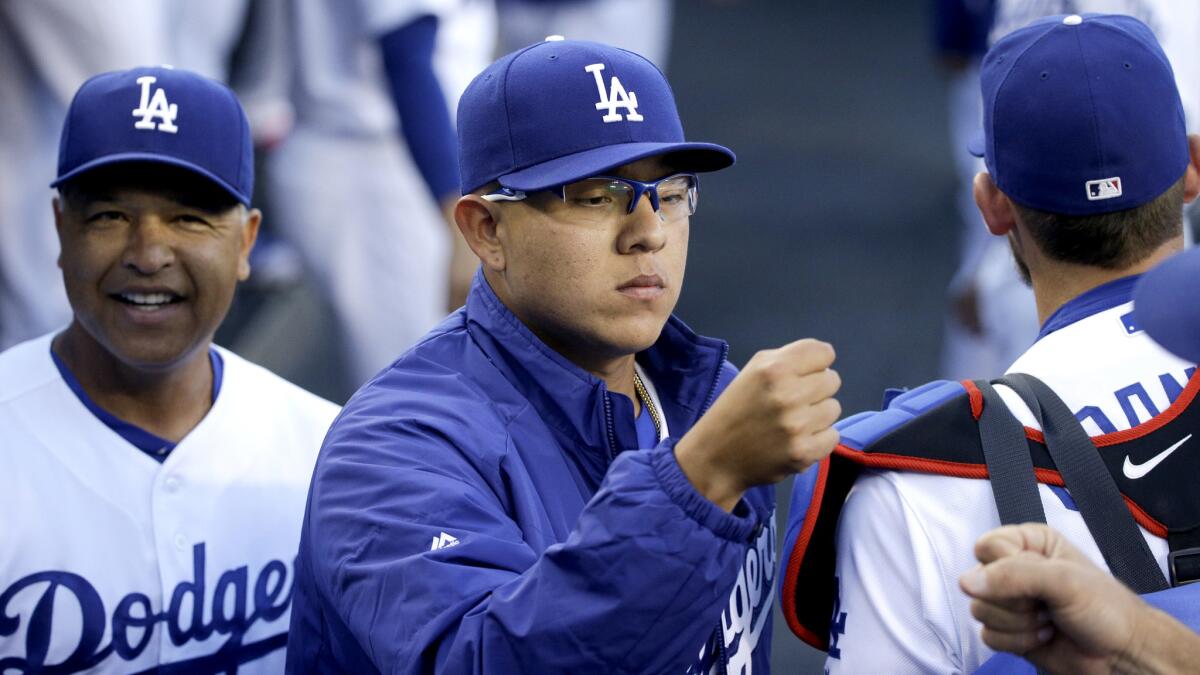The Dodgers are winners in the new MLB labor deal

- Share via
One of the silliest experiments in baseball history died painlessly late Wednesday night. No one mourned.
The “This Time It Counts” fiasco — trying to legislate meaning to the All-Star Game by giving the winning league the home-field edge in the World Series — passed away after 14 years.
The stunt has been replaced by common sense. The team with the better record gets home-field advantage in the World Series, the most appealing wrinkle of the new collective bargaining agreement.
Although the language of the agreement still is being finalized, the Dodgers are clear winners.
The Dodgers aren’t trying to run a $300-million payroll any more. What the stiff luxury taxes in the new agreement do is drastically diminish the chances of another team trying to do that.
In the meantime, the Dodgers already have stocked up on young talent, in part because of lavish spending in Latin America. What the restricted spending on international amateurs does is drastically diminish the chances of another team’s trying to do that.
And, when another team tries to decide whether to trade a pending free agent or let him walk, the Dodgers have the talent pipeline to take advantage of what should be a cheaper price.
No longer can a team with a quality player on the verge of free agency count on getting a top draft pick if he leaves. That team now has to wait to see whether the player signs for at least $50 million. If he does, the old team would get a pick, but it would not come until after the first round. If he signs for less, the pick would come even later.
Take the Kansas City Royals, for instance. Under the expiring system, the Royals could get three top draft picks next winter if they lost outfielder Lorenzo Cain, first baseman Eric Hosmer and third baseman Mike Moustakas. If the Royals struggle next season — and in particular if those players struggle — the team would have less incentive to retain those players in the hope of extracting a trio of first-round picks next winter.
That, in turn, could lower the asking price in trade next July for a player like Moustakas, the Chatsworth High product, should the Royals fail to contend and the Dodgers need help at third base. The Dodgers would love to retain third baseman Justin Turner, but the new compensation rules do not take effect until next winter, so they would get a top draft pick if Turner and/or closer Kenley Jansen departs.
Also, as the new labor agreement is implemented, the Dodgers are in prime position to take advantage of unintended consequences — that is, the loopholes no one envisioned at the bargaining table.
Under the expiring labor agreement, a two-year restriction on signing international amateurs was supposed to be a deterrent to extravagant bonuses. Instead, the Dodgers and other teams happily blew past the intended spending limits, stocking up on enough talent to make the two-year restriction all but irrelevant.
There will be such unintended consequences in the new agreement. The Dodgers no doubt will find them, thanks not only to a sizable and smart executive group but also to a research-and-development unit that included eight staffers as of last season.
The new All-Star Game rule should eradicate memories of the most unappealing picture of Bud Selig’s 22-year reign as commissioner. When both leagues ran out of pitchers after 11 innings of the 2002 All-Star Game, Selig infamously shrugged his shoulders and called the game a tie.
Selig then shepherded the change, with an assist from Fox. Surely the drama would be greater, and the ratings would be higher.
Or not. The ratings were no higher. The managers were forced to keep a handful of players in reserve for extra innings of an exhibition game, even if some of those players might never again make an All-Star team.
And the players mocked the concept. In 2012, Detroit Tigers ace Justin Verlander gave up five runs in the first inning, and the American League lost. Verlander came out pumping fastballs, some at 100 and 101 mph, to see whether he could blow away the best of the National League.
In 2014 — the final All-Star Game for New York Yankees icon Derek Jeter — St. Louis Cardinals pitcher Adam Wainwright said he had given Jeter “a couple of pipe shots,” one of which Jeter hit for a double.
Wainwright later said he “misspoke” and called himself an “idiot” for suggesting he grooved pitches to Jeter.
“If he grooved it, thank you,” Jeter said. “I appreciate it.”
When Rob Manfred replaced Selig as commissioner last year, we asked if he would change the All-Star format.
“My view on the home-field advantage is that it has altered the way the game has been played in a positive way for the fans,” Manfred said then. “Anything that makes the game better for the fans, I’m going to move very slowly on, in terms of making a change.”
He moved, and, thankfully, pretty quickly at that.
Follow Bill Shaikin on Twitter @BillShaikin
ALSO
Dodgers avoid arbitration with Chris Hatcher and Scott Van Slyke
MLB players and owners avert lockout with new labor deal only hours before deadline
After $1 billion in player spending, Dodgers under MLB mandate to cut debt
More to Read
Go beyond the scoreboard
Get the latest on L.A.'s teams in the daily Sports Report newsletter.
You may occasionally receive promotional content from the Los Angeles Times.











